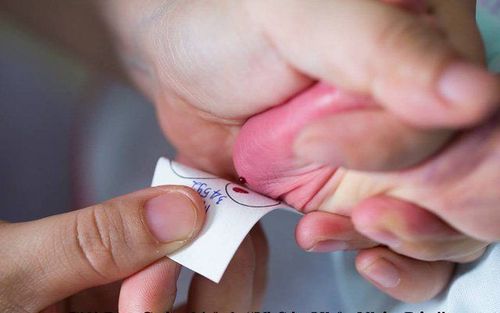This is an automatically translated article.
The article is professionally consulted by Master, Doctor Doan Ngoc Quynh Tram - Department of Pediatrics - Neonatology - Vinmec Nha Trang International General Hospital.At 25 weeks, your baby will show signs of trying to move on his own and also spend a lot of time smiling and chatting with anyone who gets his attention. At this age, you will see a lot of changes in your baby as he grows and develops under the loving care of his family.
During this time, you are the one doing everything for the baby. However, children are starting to show signs of becoming independent. Children grow and learn very quickly, and as a parent, you must help and encourage them. At 25 weeks, your baby's brain begins to develop more to recognize more things. Teething can be a big problem at this age.
1. Development of a 25-week-old baby
During the period before the baby is 25 weeks old, it is the parents or caregivers who do everything for the baby. By this time, however, your baby is starting to show signs of trying to be more independent in activities. Babies will also develop and learn very quickly from their parents and those around them. Therefore, the actions performed in front of the baby need to be of a high standard.
At 25 weeks, your baby's brain begins to develop and can perceive more things. Babies will show their parents signs that they are ready for solid foods and are capable of complex activities. Teething can also be a problem at this age, causing babies to cry a lot, drool or have a fever and swollen gums.
1.1. Feeding a 25-week-old baby Before 25 weeks of age, it is common for parents to give their baby some cereal with breast milk or formula. However, it's time to start giving your baby a reasonable weaning diet. Your baby will feel more interested in foods with sweet flavors.
Parents can also give babies some foods that are finely chopped like crackers, but care should be taken to avoid choking or choking. In addition, you should regularly change the types of dishes to avoid the baby feeling bored with certain foods.

Trẻ 25 tuần tuổi vẫn cần được bú sữa mẹ thường xuyên
1.2. Put a 25-week-old baby to sleep Here are some sleeping habits of your baby at 25 weeks old:
Every day, your baby can sleep about 14-15 hours. Of which about 11 hours at night while the rest are naps during the day Some babies at this age are ready to get into the nap routine Babies can also have a sleep disorder at this age. This age is caused by a number of reasons such as the promotion of growth and teething. Your baby may also wake up frequently during the night. Like adults, babies also tend to wake up in the middle of the night. Doctors give advice to parents who need to practice so that children can easily fall into deep sleep at this age. Although at this stage the baby is very interested in rolling and crawling, it is not advisable to let the baby sleep in the prone position because it will affect the internal organs of the baby's body. 1.3. Some tips for taking care of a 25-week-old baby Here are a few tips that parents can apply to take better care of their 25-week-old baby:
Some women choose to give their babies milk from a bottle instead. because it sucks directly from the mother's breast. There are many types of bottles that are suitable for this method. There are many children who can crawl, even crawl very quickly during this period, so it is better to ensure home hygiene to avoid the risk of children getting diseases related to this method. dermatological, gastrointestinal and respiratory. 25-week-old babies also love to turn over, so parents need to consider spreading a mat or on the floor to prevent the baby from falling from the bed to the ground, causing injury in case parents are inattentive. If your child is interested in foods and wants to use a spoon to scoop them up, let him do it himself. This can cause food to spill and stick to your child's clothes but will teach them a lot and help them learn how to use a spoon faster. 1.4. Tests and vaccines Experts recommend taking your baby for regular check-ups. If possible, get your child vaccinated against the flu as soon as he or she is old enough. Babies in this age group usually receive several vaccines such as 13-valent pneumococcal conjugate vaccine (PCV13), quimi-Hib vaccine, DtaP, Rotavirus, hepatitis B, meningococcal vaccine. .. Parents should pay attention to the injection schedule in order to arrange a reasonable time to take the child for injection.

Mỗi ngày, bé 25 tuần tuổi có thể ngủ khoảng 14-15 tiếng.
1.5. Games and activities suitable for 25-week-old babies There is nothing better for your baby than playing with you. Not only is this fun for parents or gives them more time to bond with their children, it can also help their baby's physical, mental, social and emotional development. Here are some games that can be used at this stage:
Sorting pictures: All parents need for this game is an album of pictures of themselves, their children and other people. other body. Your 25-week-old baby will show excitement with the pictures, especially those with bright colors. Help your baby shape some activities: 25-week-old babies will be fascinated by almost any activity from their parents or those around them. Show your child what can happen if you flip the switch on, maybe even have him ring the doorbell or turn on the faucet himself. These activities can help children learn about certain effects if they do them.
2. Your baby's 25-week-old milestone
Each month of age, even each week of age, can bring about a greater change in a child's development, helping him to better observe and learn about the world around him. Here are some notable milestones during your baby's 25th week:
Your baby will learn to roll over, especially during diaper changes. This creates certain interests for both children and parents. Baby will also be very attentive and interested in what parents or people around say. Babies this age are learning to associate the gestures and sounds received from adults and try to give feedback in return. For example, babies learn that when they cry they get everyone's attention, or when they laugh, everyone laughs.... They also start repeating a few syllables and will enjoy hearing those sounds. Regular conversations with children can help their language development better. Most babies also gradually get used to solid foods at this stage. Children should be seated upright while eating to stimulate the tongue reflex in swallowing food Children laugh more at this age and learn to use their hands to grasp and often throw objects around. Not all babies develop in the same way around 25 weeks of age. They will hit milestones from time to time as long as they feel comfortable. Premature babies often take longer to reach these developmental milestones. If your baby has not yet begun to have emotional states such as laughter, hey, no response to sounds, you need to consider taking him to the doctor. Raising children takes a lot of time, effort and requires patience but with love and guidance from parents they will be able to develop in the most positive direction.

25 tuổi tuần, trẻ đã có thể tự ngồi 1 mình
25-week-old babies are generally susceptible to respiratory diseases, respiratory infections and gastrointestinal infections if they start solids early or the storage and preparation of milk is not guaranteed. To protect children's health, parents should do well to exclusively breastfeed their babies for the first 6 months (if possible) and vaccinate on schedule.
Caring, protecting and nurturing children is a long process, so parents should be a companion to help children develop their physical and mental abilities well. If you notice that your child has unusual signs for his age or has difficulties in taking care of and teaching him or her, you can go to Vinmec International General Hospital to get help from doctors and nurses. Psychologists.
25-week-old babies need 5mg of elemental zinc/day to eat well, reach the correct height and weight and exceed the standard. Zinc plays a role in affecting most biological processes taking place in the body, especially the breakdown of nucleic acids, proteins... Organs in the body when zinc deficiency can lead to a There are a number of diseases such as neurological disorders, irritability, etc. Therefore, parents need to learn about the role of zinc and guide them to appropriate zinc supplements for their children.
In addition to zinc, parents also need to supplement their children with other important vitamins and minerals such as lysine, chromium, B vitamins,... errands.
Please regularly visit Vinmec.com website and update useful information to take care of your baby and family.
References: parenting.firstcry.com, mamanatural.com














